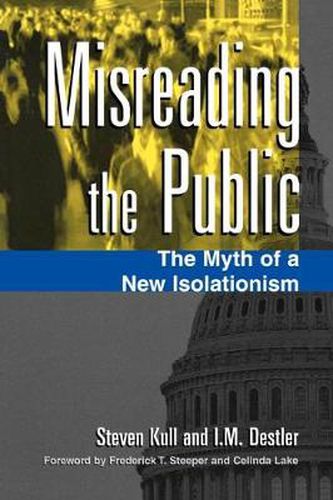Readings Newsletter
Become a Readings Member to make your shopping experience even easier.
Sign in or sign up for free!
You’re not far away from qualifying for FREE standard shipping within Australia
You’ve qualified for FREE standard shipping within Australia
The cart is loading…






Do American policymakers really know what the American public wants in U.S. foreign policy? Through extensive interviews with members of the policy community, the authors reveal a pervasive belief -especially in Congress -that, in the wake of the cold war, the public is showing a new isolationism: opposition to foreign aid, hostility to the United Nations, and aversion to contributing U.S. troops to peacekeeping operations. This view of the public has in turn had a significant impact on U.S. foreign policy.
However, through a comprehensive review of polling data, as well as focus groups, the authors show that all these beliefs about the public are myths. The public does complain that the United States is playing the role of dominant world leader more than it should, but this does not lead to a desire to withdraw. Instead people prefer to share responsibility with other nations, particularly through the UN.
The authors offer explanations of how such a misperception can occur and suggest ways to improve communication between the public and policymakers, including better presentation of polling data and more attention by practitioners to a wider public.
$9.00 standard shipping within Australia
FREE standard shipping within Australia for orders over $100.00
Express & International shipping calculated at checkout
Stock availability can be subject to change without notice. We recommend calling the shop or contacting our online team to check availability of low stock items. Please see our Shopping Online page for more details.
Do American policymakers really know what the American public wants in U.S. foreign policy? Through extensive interviews with members of the policy community, the authors reveal a pervasive belief -especially in Congress -that, in the wake of the cold war, the public is showing a new isolationism: opposition to foreign aid, hostility to the United Nations, and aversion to contributing U.S. troops to peacekeeping operations. This view of the public has in turn had a significant impact on U.S. foreign policy.
However, through a comprehensive review of polling data, as well as focus groups, the authors show that all these beliefs about the public are myths. The public does complain that the United States is playing the role of dominant world leader more than it should, but this does not lead to a desire to withdraw. Instead people prefer to share responsibility with other nations, particularly through the UN.
The authors offer explanations of how such a misperception can occur and suggest ways to improve communication between the public and policymakers, including better presentation of polling data and more attention by practitioners to a wider public.